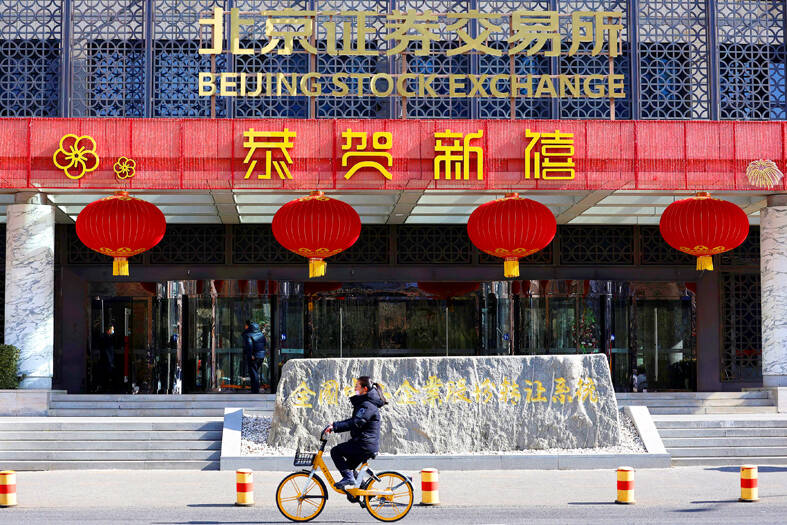MSCI Inc is cutting dozens of Chinese companies from its global benchmarks, after many stocks tumbled as the market erased trillions of dollars in value.
The index provider is removing 66 companies from its MSCI China Index in its latest quarterly review, the highest tally in at least two years.
The changes, effective as of the close on Feb. 29, also apply to the MSCI All Country World Index.

Photo: Reuters
Stocks to be cut include property developers Gemdale Corp (金地) and Greentown China Holdings Ltd (綠城中國), as well as China Southern Airlines Co (中國南方航空) and Ping An Healthcare and Technology Co (平安健康互聯網).
The removals come as China’s weighting in global portfolios slumps amid worries about its struggling property sector and weak consumption, and as alternatives such as India become more prominent.
In a sign of the deep pessimism about the China and Hong Kong stock markets, equity rallies spurred by a slew of policy support measures last week faded within a few sessions ahead of the Lunar New Year break.
“It highlights the issue of negative flows for Chinese stocks as investors reduce exposure to the country, in large part due to recent weak fundamentals, but also fears of ongoing financial instability, regulatory uncertainty, and — most of all — country risk,” Capital.Com Inc senior analyst Kyle Rodda said.
“Some investors may also be forced to liquidate because of losses already incurred or because certain companies no longer fall within investment mandates,” he added.
Three stocks are to be deleted from the Hong Kong index as well: Budweiser Brewing Co APAC Ltd, New World Development Co (新世界發展) and Xinyi Glass Holdings Ltd (信義玻璃控股).
Index-hugging funds will have to purge these stocks from their portfolios. There is at least US$5.9 billion in exchange-traded funds tracking the MSCI China Index, the largest of which is the US-listed iShares MSCI China ETF, according to Bloomberg-compiled data.
The news was not all about cuts, though. Five components are to be added to the MSCI China Index, including electrical-appliance maker Midea Group Co (美的集團) and skin-treatment company Giant Biogene Holding Co (巨子生物).
Still, the high number of deletions could weigh as Hong Kong resumes trading today. MSCI takes a number of factors into account for including stocks in its standard indices including market capitalization, free float and extreme price increases.
“The deletion list of Chinese companies, spanning across a wide range of sectors from technology, property and retail to healthcare, solidifies the perception of systemic-based concerns over the world’s second-largest economy,” IG Markets Ltd analyst Hebe Chen (陳碧菲) said.

Intel Corp chief executive officer Lip-Bu Tan (陳立武) is expected to meet with Taiwanese suppliers next month in conjunction with the opening of the Computex Taipei trade show, supply chain sources said on Monday. The visit, the first for Tan to Taiwan since assuming his new post last month, would be aimed at enhancing Intel’s ties with suppliers in Taiwan as he attempts to help turn around the struggling US chipmaker, the sources said. Tan is to hold a banquet to celebrate Intel’s 40-year presence in Taiwan before Computex opens on May 20 and invite dozens of Taiwanese suppliers to exchange views

Application-specific integrated circuit designer Faraday Technology Corp (智原) yesterday said that although revenue this quarter would decline 30 percent from last quarter, it retained its full-year forecast of revenue growth of 100 percent. The company attributed the quarterly drop to a slowdown in customers’ production of chips using Faraday’s advanced packaging technology. The company is still confident about its revenue growth this year, given its strong “design-win” — or the projects it won to help customers design their chips, Faraday president Steve Wang (王國雍) told an online earnings conference. “The design-win this year is better than we expected. We believe we will win

Chizuko Kimura has become the first female sushi chef in the world to win a Michelin star, fulfilling a promise she made to her dying husband to continue his legacy. The 54-year-old Japanese chef regained the Michelin star her late husband, Shunei Kimura, won three years ago for their Sushi Shunei restaurant in Paris. For Shunei Kimura, the star was a dream come true. However, the joy was short-lived. He died from cancer just three months later in June 2022. He was 65. The following year, the restaurant in the heart of Montmartre lost its star rating. Chizuko Kimura insisted that the new star is still down

While China’s leaders use their economic and political might to fight US President Donald Trump’s trade war “to the end,” its army of social media soldiers are embarking on a more humorous campaign online. Trump’s tariff blitz has seen Washington and Beijing impose eye-watering duties on imports from the other, fanning a standoff between the economic superpowers that has sparked global recession fears and sent markets into a tailspin. Trump says his policy is a response to years of being “ripped off” by other countries and aims to bring manufacturing to the US, forcing companies to employ US workers. However, China’s online warriors